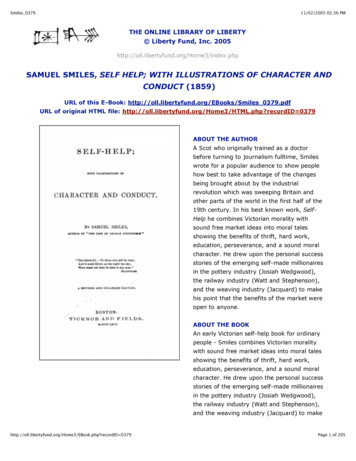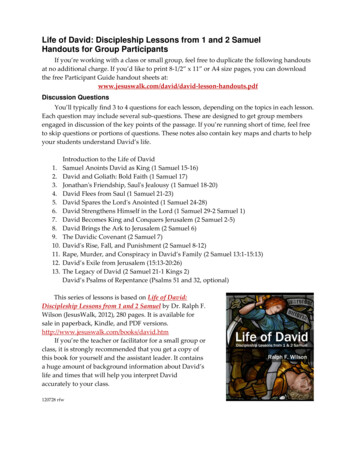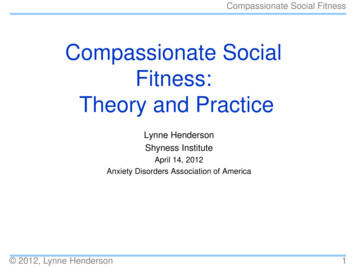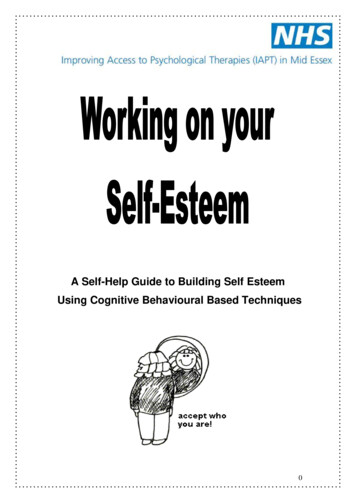
Transcription
Smiles 037911/02/2005 02:36 PMTHE ONLINE LIBRARY OF LIBERTY Liberty Fund, Inc. EL SMILES, SELF HELP; WITH ILLUSTRATIONS OF CHARACTER ANDCONDUCT (1859)URL of this E-Book: http://oll.libertyfund.org/EBooks/Smiles 0379.pdfURL of original HTML file: http://oll.libertyfund.org/Home3/HTML.php?recordID 0379ABOUT THE AUTHORA Scot who originally trained as a doctorbefore turning to journalism fulltime, Smileswrote for a popular audience to show peoplehow best to take advantage of the changesbeing brought about by the industrialrevolution which was sweeping Britain andother parts of the world in the first half of the19th century. In his best known work, SelfHelp he combines Victorian morality withsound free market ideas into moral talesshowing the benefits of thrift, hard work,education, perseverance, and a sound moralcharacter. He drew upon the personal successstories of the emerging self-made millionairesin the pottery industry (Josiah Wedgwood),the railway industry (Watt and Stephenson),and the weaving industry (Jacquard) to makehis point that the benefits of the market wereopen to anyone.ABOUT THE BOOKAn early Victorian self-help book for ordinarypeople - Smiles combines Victorian moralitywith sound free market ideas into moral talesshowing the benefits of thrift, hard work,education, perseverance, and a sound moralcharacter. He drew upon the personal successstories of the emerging self-made millionairesin the pottery industry (Josiah Wedgwood),the railway industry (Watt and Stephenson),and the weaving industry (Jacquard) to makehis point that the benefits of the market ordID 0379Page 1 of 205
Smiles 037911/02/2005 02:36 PMhis point that the benefits of the market wereopen to anyone.THE EDITION USEDSelf Help; with Illustrations of Character andConduct (Boston: Ticknor and Fields, 1863).COPYRIGHT INFORMATIONThe text of this edition is in the public domain.FAIR USE STATEMENTThis material is put online to further theeducational goals of Liberty Fund, Inc. Unlessotherwise stated in the Copyright Informationsection above, this material may be usedfreely for educational and academic purposes.It may not be used in any way for profit.TABLE OF CONTENTSINTRODUCTION.CHAPTER I. SELF-HELP,—NATIONAL AND INDIVIDUAL.FOOTNOTES FOR PART I, CHAPTER ICHAPTER II. LEADERS OF INDUSTRY,—INVENTORS AND PRODUCERS.CHAPTER III. APPLICATION AND PERSEVERANCE.FOOTNOTES FOR PART I, CHAPTER IIICHAPTER IV. HELPS AND OPPORTUNITIES — SCIENTIFIC PURSUITS.FOOTNOTES FOR PART I, CHAPTER IVCHAPTER V. WORKERS IN ART.CHAPTER VI. INDUSTRY AND THE ENGLISH PEERAGE.FOOTNOTES FOR PART I, CHAPTER VICHAPTER VII. ENERGY AND COURAGE.FOOTNOTES FOR PART I, CHAPTER VIICHAPTER VIII. BUSINESS QUALITIES.FOOTNOTES FOR PART I, CHAPTER VIIICHAPTER IX. MONEY, — USE AND ABUSE.FOOTNOTES FOR PART I, CHAPTER IXCHAPTER X. k.php?recordID 0379Page 2 of 205
Smiles 037911/02/2005 02:36 PMFOOTNOTES FOR PART I, CHAPTER XCHAPTER XI. FACILITIES AND DIFFICULTIES.FOOTNOTES FOR PART I, CHAPTER XICHAPTER XII. EXAMPLE, — MODELS.CHAPTER XIII. CHARACTER. — THE TRUE GENTLEMAN.FOOTNOTES FOR PART I, CHAPTER XIIISAMUEL SMILES, SELF HELP; WITH ILLUSTRATIONS OF CHARACTER ANDCONDUCT (1859)SELF-HELP;WITH ILLUSTRATIONS OFCHARACTER AND ?recordID 0379Page 3 of 205
Smiles 037911/02/2005 02:36 PMBY SAMUEL SMILES,AUTHOR OF "THE LIFE OF GEORGE STEPHENSON""This above all,—To thine own self be true;And it must follow, as the night the day,Thou canst not then be false to any man."SHAKSPEARE.A REVISED AND ENLARGED EDITION.BOSTON:TICKNOR AND FIELDS.M DCCC LXIII.T HE American edition of "SELF -HELP," published by Messrs. T ICKNOR AND F IELDS, is the only oneauthorized by me, as they did me the honor to enter into an arrangement, previous to thepublication of the work in England, to bring it out simultaneously in the United States.T HE AUTHOR.RIVERSIDE, CAMBRIDGE :STEREOTYPED AND PRINTED BYH. O. HOUGHTON .INTRODUCTION.T HE origin of this book may be briefly told.Some fifteen years since, the author was requested to deliver an address before the membersof some evening classes, which had been formed in a northern town for mutual improvement,under the following circumstances:—Two or three young men of the humblest rank resolved to meet in the winter evenings, for thepurpose of improving themselves by exchanging knowledge with each other. Their first meetingswere held in the room of a cottage in which one of the members lived; and, as others shortlyjoined them, the place soon became inconveniently filled. When summer set in, they adjournedto the cottage garden outside; and the classes were then held in the open air, round a littleboarded but used as a garden-house, in which those who officiated as teachers set the sums,and gave forth the lessons of the evening. When the weather was fine, the youths might beseen, until a late hour, hanging round the door of the hut like a cluster of bees; but sometimesa sudden shower of rain would dash the sums from their slates, and disperse them for theevening unsatisfied.Winter, with its cold nights, was drawing near, and what were they to do for shelter? Theirnumbers had by this time so increased, that no room of an ordinary cottage cordID 0379Page 4 of 205
Smiles 037911/02/2005 02:36 PMnumbers had by this time so increased, that no room of an ordinary cottage couldaccommodate them. Though they were for the most part young men earning comparativelysmall weekly wages, they resolved to incur the risk of hiring a room; and, on making inquiry,they found a large, dingy apartment to let, which had been used as a temporary Cholerahospital. No tenant could be found for the place, which was avoided as if a plague still clung toit. But the mutual improvement youths, nothing daunted, hired the cholera-room, at so much aweek, lit it up, placed a few benches and a deal table in it, and began their winter classes. Theplace soon presented a busy and cheerful appearance in the evenings. The teaching may havebeen, as no doubt it was, of a very rude and imperfect sort; but it was done with a will. Thosewho knew a little taught those who knew less, —improving themselves while they improved theothers; and, at all events, setting before them a good working example. Thus these youths—and there were also grown men amongst them—proceeded to teach themselves and each other,reading and writing, arithmetic and geography; and even mathematics, chemistry, and some ofthe modern languages.About a hundred young men had thus come together, when, growing ambitious, they desired tohave lectures delivered to them; and then it was that the author became acquainted with theirproceedings. A party of them waited on him, for the purpose of inviting him to deliver anintroductory address, or, as they expressed it, "to talk to them a bit;" prefacing the request bya modest statement of what they had done and what they were doing. He could not fail to betouched by the admirable self-helping spirit which they had displayed; and, though entertainingbut slight faith in popular lecturing, he felt that a few words of encouragement, honestly andsincerely uttered, might not be without some good effect. And in this spirit he addressed themon more than one occasion, citing examples of what other men had done, as illustrations ofwhat each might, in a greater or less degree, do for himself; and pointing out that theirhappiness and well-being as individuals in afterlife, must necessarily depend mainly uponthemselves, —upon their own diligent self-culture, self-discipline, and self-control, —and, aboveall, on that honest and upright performance of individual duty, which is the glory of manlycharacter.There was nothing in the slightest degree new or original in this counsel, which was as old asthe Proverbs of Solomon, and possibly quite as familiar. But old-fashioned though the advicemay have been, it was welcomed. The youths went forward in their course; worked on withenergy and resolution; and, reaching manhood, they went forth in various directions into theworld, where many of them now occupy positions of trust and usefulness. Several years afterthe incidents referred to, the subject was unexpectedly recalled to the author's recollection byan evening visit from a young man, —apparently fresh from the work of a foundry, —whoexplained that he was now an employer of labor and a thriving man; and he was pleased toremember with gratitude the words spoken in all honesty to him and to his fellow-pupils yearsbefore, and even to attribute some measure of his success in life to the endeavors which hehad made to work up to their spirit.The author's personal interest having in this way been attracted to the subject of Self-Help, hewas accustomed to add to the memoranda from which he had addressed these young men; andto note down occasionally in his leisure evening moments, after the hours of business, rdID 0379Page 5 of 205
Smiles 037911/02/2005 02:36 PMto note down occasionally in his leisure evening moments, after the hours of business, theresults of such reading, observation, and experience of life, as he conceived to bear upon it.One of the most prominent illustrations cited in his earlier addresses, was that of GeorgeStephenson, the engineer; and the original interest of the subject, as well as the specialfacilities and opportunities which the author possessed for illustrating Mr. Stephenson's life andcareer, induced him to prosecute it at his leisure, and eventually to publish his biography. Thepresent volume is written in a similar spirit, as it has been similar in its origin. The illustrativesketches of character introduced, are, however, necessarily less elaborately treated, —beingbusts rather than full-length portraits, and, in many of the cases, only some striking feature hasbeen noted; the lives of individuals, as indeed of nations, often concentrating their lustre andinterest in a few passages. Such as the book is, the author now leaves it in the hands of thereader; in the hope that the lessons of industry, perseverance, and self-culture, which itcontains, will be found useful and instructive, as well as generally interesting.London, September, 1859.CONTENTS.CHAPTER I. SELF-HELP, —NATIONAL AND INDIVIDUAL .Spirit of self-help — Institutions and men —National progress and decay — Government a reflex of the individualism of a nation — Trueliberty rests on character — Energetic self-help a prominent feature in the English character —The greatest workers have sprung from the ranks — Uses of biography — Marked individualityof the Englishman — His school of practical life — Opinions of foreigners as to Englishcharacter: Goethe, Wiese, Rendu — Energy of character exhibited in the humbler ranks —Barbers — Shakspeare — Day-laborers — Weavers — Shoemakers — Tailors — Humble origin ofmany eminent men — Discovery of a geologist by Sir R. Murchison — Industry honorablyrecognized in England — Joseph Brotherton — W. S. Lindsay — The middle classes — Newtonand Adams — Sons of clergymen — Sons of attorneys — Sons of tradesmen — Richard Owen —Individual application the price of success — Riches not necessary — The wealthy classes —Scientific men: Bacon, Boyle, Cavendish, Rosse — Eminent politicians: Peel, Brougham, BulwerLytton, Disraeli — The national character put to the test in India — Montalembert's opinion —Modern heroismCHAPTER II. LEADERS OF INDUSTRY, — INVENTORS AND PRODUCERS .Industry of the English nation —Work the best educator — The great inventors principally working men — Forgotten inventors —Invention of the steam-engine — James Watt — Establishment of the cotton manufacture — SirRichard Arkwright — Business qualities of Matthew Boulton — The Peels of South Lancashire —Robert Peel — His invention of calico-printing — His character described by his son — The firstSir Robert Peel (of Bury); his small beginnings as a manufacturer — Peel's marriage — Hissuccess — Josiah Wedgwood, founder of the Staffordshire Potteries; his industry, energy, andsuccess — Herbert Minton — Industrial heroes.CHAPTER III. APPLICATION AND PERSEVERANCE .Fortune on the side of the industrious — Genius ispatience — Newton and Kepler — G. P. Bidder — Industry of eminent men — Repetition ofeffort — Sir Robert Peel's cultivation of memory in Drayton Church — Facility comes by practice— Impatience deprecated — Cheerfulness — Sydney Smith — Dr. Hook — Hope, an p?recordID 0379Page 6 of 205
Smiles 037911/02/2005 02:36 PM— Impatience deprecated — Cheerfulness — Sydney Smith — Dr. Hook — Hope, an importantelement in character — Carey, the missionary — Anecdote of Dr. Young — Anecdote ofAudubon, the ornithologist — Anecdote of Mr. Carlyle and the MS. of his "French Revolution" —Perseverance displayed in the discovery of the Nineveh marbles by Rawlinson and Layard — SirWalter Scott's perseverance — John Britton — London — Samuel Drew — Joseph Hume.CHAPTER IV. HELPS AND OPPORTUNITIES, —SCIENTIFIC PURSUITS.No great result achieved byaccident — Newton's discoveries — Dr. Young — Intelligent observation — Galileo — Inventionsof Brown, Watt, and Brunel, accidentally suggested — Philosophy in little things — Franklin andGalvani — Discovery of steam-power — Opportunity must be seized or made — Humble tools ofgreat workers — Lee and Stone's opportunities for learning — Sir Walter Scott's — Dr. Priestley— Sir Humphry Davy — Faraday — Davy and Coleridge — Cuvier and Hugh Miller — Sir JosephPaxton — Dalton's industry — Examples of improvement of time — Elihu Burritt — Daguesseauand Bentham — Melancthon and Baxter — Writing down observations — Great note-makers —John Hunter; his patient study of little things — Harvey — Jenner — Sir Charles Bell — Dr.Marshall Hall — Sir William Herschel — William Smith, the geologist — Hugh Miller — Sir R.Murchison.CHAPTER V. WORKERS IN ART.Sir Joshua Reynolds's belief in the force of industry — Englishartists self-educated — Michael Angelo an indefatigable worker — Art, a long labor — Wilson —Early indications of artistic taste — Hogarth's habits of observation and industry — Banks —Mulready — Nollekens — Career of Flaxman — Chantrey — Wilkie and Haydon — Turner —Privations endured by artists — Martin — l'ugin — Kemp — Gibson — Thorburn — Noel Paton —James Sharples — Industry of musicians; Haydn, Beethoven, Bach, Meyerbeer — Dr. Arne —William Jackson.CHAPTER VI. INDUSTRY AND THE ENGLISH PEERAGE .The peerage fed from the industrial ranks —Intermingling of classes — Peers among mechanics — Peerages founded by London tradesmenand merchants — Perseverance of Richard Foley, founder of the Foley peerage — Adventurouscareer of Sir William Phipps, founder of the Normanby peerage — Sir William Petty, founder ofthe Lansdowne peerage — Jedediah Strutt, founder of the Belper peerage — Naval and militarypeers — Peerages founded by lawyers — Lord Mansfield — Lord St. Leonards — Lord Tenterden— Lord Campbell — Lord Eldon — Lord Langdale.CHAPTER VII. ENERGY AND COURAGE .Energy characteristic of the Tentonic race — The foundationsof strength of character — Force of purpose — Power of will — Courageous working — The willpractically free — Words of Lammenais and Buxton — Where there is a will there is a way —Suwarrow — Napoleon — Wellington — Promptitude of action — The energy displayed byEnglishmen in India — Warren Hastings — Napier — The Indian swordsman — The recentrebellion — The Lawrences — Nicholson — Siege of Delhi — Hodson — Missionary Aborers —Henry Martyn — John Williams — David Livingstone — Howard — The career of Jonas Hanway— The labors of Granville Sharp — Clarkson — Fowell Buxton.CHAPTER VIII. BUSINESS QUALITIES.Hazlitt's definition of the man of business — His chiefqualities — Men of genius men of business — Shakspeare, Chaucer, Spenser, Milton, Cowper,Scott, Wordsworth — Ricardo, Grote, Mill — Industry and application the price of success —Lord Melbourne's advice — The school of difficulty wholesome — Conditions of success in law —Too much ease not good for a man — Causes of failure — Every man his own best friend dID 0379Page 7 of 205
Smiles 037911/02/2005 02:36 PMworst enemy — Dr. Johnson on the alleged injustice of "the world" — Practical qualitiesnecessary in business — Attention to small matters — Accuracy — Words of Mr. Dargan —Charles James Fox — Method — Lord Burleigh and De Witt, their dispatch of business —Promptitude — Economy of time — Punctuality — Energy — Tact — Routine and Red-Tapeism —The Duke of Wellington's career as a man of business — Honesty the best policy — Integrity inbusiness — Words of Baron Dupin — Trials and temptations of trade — Confidence reposed bybusiness men in each other — Dishonesty in business — The "happy warrior" — David Barclay.CHAPTER IX. MONEY, — USE AND ABUSE .The right use of money a test of practical wisdom —Economy necessary to independence — The improvident classes helpless — Importance offrugality as a public question — Words of Richard Cobden and John Bright — Independencewithin reach of most working men — High purposes of economy — Advice given to FrancisHorner by his father — Robert Burns — Living within the means — Wasters — Running into debt— The debtor a slave — Haydon's debts — Fichte — Dr. Johnson on debt — The Duke ofWellington on debt — Washington — Earl St. Vincent — Beginning well — Living too high, a vicein England — Napier's general order to his officers in India — Resistance to temptation — HughMiller's case — High standard of living necessary — Secret of money-making embodied inpopular proverbs — Career of Thomas Wright — All honest industry honorable — An illustrioussweep — Mere money-making — The "love of money" — Worldly success — The power ofmoney over-estimated — Joseph Brotherton — Respectability, its highest standard.CHAPTER X. SELF-CULTURE .Culture must include all parts of man's nature — Physical culture —Words of Milton — Neglect of bodily exercise produces mental green-sickness as well as illhealth — Words of Hodson — Free use of the body and limbs neglected — Uses of mechanicalwork — Early physical self-culture of Newton — Success of professional men very much aquestion of health — Lawyers and legislators — Lords Palmerston and Brougham — Health ofSir Walter Scott — The divines Barrow, Fuller, and Clarke — Diligent application necessary forself-culture — Resolute purpose — Plodding is on the road of genius — Thoroughness — LordSt. Leonards and Bulwer Lytton — Definite objects in study — Having to rely upon one's ownresources useful — Evils of want of confidence — Popular roads to knowledge — Labor-savingprocesses fallacious — Labor indispensable — Impatience to be avoided — The best culture isself-culture — Dr. Arnold — Knowledge and wisdom — "Knowledge is power," so is ignorance —Importance of literary culture probably overrated — Books not the best teachers — Thediscipline of life and action more valuable — Self-discipline and self-control — Self-respect —Knowledge as a means of "getting on" — Words of Southey — Competitive examination, itspossible evils.CHAPTER XI. FACILITIES AND DIFFICULTIES .Facilities of modern times — Mechanism of the age —Words of Ruskin — Mechanical expedients of "progress" — Mechanical education — Cramming —Knowledge made pleasant — Amusement — Novel-reading — Pursuit of pleasure — BenjaminConstant — Augustin Thierry — Coleridge and Southey — Robert Nicoll — Uses of difficulty —Beethoven's opinion of Rossini — Mendelssohn — Experience learned by encounter with difficulty— Adversity and prosperity — The battle of life an up-hill fight — Difficulty the best school ofdiscipline — Disraeli, Henry Clay, Curran — Professors Murray and Moor — William Chambers —William Cobbett — Sir Samuel Romilly — John Leyden — Professor Lee — Late learners —Illustrious dunces — Barrow, Clarke, Swift, Chalmers, Sheridan. Scott, Chat terton, ecordID 0379Page 8 of 205
Smiles 037911/02/2005 02:36 PMIllustrious dunces — Barrow, Clarke, Swift, Chalmers, Sheridan. Scott, Chat terton, Clive,Howard, and others — The difference between boys consists in energy — Their success in lifedepends on perseverance.CHAPTER XII. EXAMPLE, — MODELS .Example a great teacher — Influence of conduct — Parentalexample — No act without its train of consequences — Words of Babbage — Humanresponsibility — Every person owes a good example to others — Doing, not telling — Mrs.Chisholm — Dr. Guthrie and John Pounds — Example works in unseen directions — Goodmodels of conduct — The company of our betters — Francis Horner's views on personalintercourse — The Marquis of Lansdowne and Malesherbes — Fowell Buxton and the Gurneyfamily — Personal influence of John Sterling — Influence of artistic genius upon others —Example of the brave an inspiration to the timid — Biography valuable as furnishing highmodels of character — Lives influenced by biography — Romilly, Franklin, Drew, Alfieri, Loyola,Wolff, Horner, Reynolds — Examples of cheerfulness — Dr. Arnold's influence over others —Career of Sir John Sinclair.CHAPTER XIII. CHARACTER, — THE TRUE GENTLEMAN .Character the noblest possession of a man —Character of Francis Horner — Franklin — Character is power — Its higher qualities — LordErskine's rules of conduct — A high standard of life necessary — Truthfulness — Wellington'scharacter of Peel — Be what you seem — Integrity and honesty of action — Importance ofhabits — Habits constitute character — Growth of habit in youth — Trivial things indicatecharacter — Manners and morals — Civility and its opposite — Anecdote of Abernethy —Prejudices — Men of the great heart of no exclusive rank or class — The Grants, "BrothersCheeryble" — The Gentleman — Lord Edward Fitzgerald — Honor, probity, rectitude — Thegentleman will not be bribed — Anecdotes of Wellington and Wellesley — The poor may be richin spirit — A noble peasant — Anecdotes of the Emperor of Austria, and two English navvies —Truth makes the success of the gentleman — Courage and gentleness — Gentlemen in India —Outram, Henry Lawrence, Lord Clyde — Private soldiers at Agra — The wreck of the Birken-head— The exercise of power the crucial test of the gentleman — Sir Ralph Abercrombie — Fuller'scharacter of Sir Francis Drake.SELF—HELP, &c.CHAPTER I.SELF-HELP, — NATIONAL AND INDIVIDUAL."The worth of a State, in the long run, is the worth of the individuals composingit." — J. S. Mill."We put too much faith in systems, and look too little to men." — B. Disraelt."HEAVEN helps those who help themselves," is a well-tried maxim, embodying in a smallcompass the results of vast human experience. The spirit of self-help is the root of all genuinegrowth in the individual; and, exhibited in the lives of many, it constitutes the true source ofnational vigor and strength. Help from without is often enfeebling in its effects, but help fromwithin invariably invigorates. Whatever is done for men or classes, to a certain extent cordID 0379Page 9 of 205
Smiles 037911/02/2005 02:36 PMwithin invariably invigorates. Whatever is done for men or classes, to a certain extent takesaway the stimulus and necessity of doing for themselves; and where men are subjected toover-guidance and over-government, the inevitable tendency is to render them comparativelyhelpless.Even the best institutions can give a man no active aid. Perhaps the utmost they can do is, toleave him free to develop himself and improve his individual condition. But in all times menhave been prone to believe that their happiness and well-being were to be secured by means ofinstitutions rather than by their own conduct. Hence the value of legislation as an agent inhuman advancement has always been greatly over-estimated. To constitute the millionth part ofa legislature, by voting for one or two men once in three or five years, however conscientiouslythis duty may be performed, can exercise but little active influence upon any man's life andcharacter. Moreover, it is every day becoming more clearly understood, that the function ofgovernment is negative and restrictive, rather than positive and active; being resolvableprincipally into protection, — protection of life, liberty, and property. Hence the chief "reforms"of the last fifty years have consisted mainly in abolitions and disenactments. But there is nopower of law that can make the idle man industrious, the thriftless provident, or the drunkensober; though every individual can be each and all of these if he will, by the exercise of his ownfree powers of action and self-denial. Indeed, all experience serves to prove that the worth andstrength of a state depend far less upon the form of its institutions than upon the character ofits men. For the nation is only the aggregate of individual conditions, and civilization itself isbut a question of personal improvement.National progress is the sum of individual industry, energy, and uprightness, as national decayis of individual idleness, selfishness, and vice. What we are accustomed to decry as great socialevils, will, for the most part, be found to be only the outgrowth of our own perverted life; andthough we may endeavor to cut them down and extirpate them by means of law, they will onlyspring up again with fresh luxuriance in some other form, unless the conditions of human lifeand character are radically improved. If this view be correct, then it follows that the highestpatriotism and philanthropy consist, not so much in altering laws and modifying institutions, asin helping and stimulating men to elevate and improve themselves by their own free andindependent action.The government of a nation itself is usually found to be but the reflex of the individualscomposing it. The government that is ahead of the people will be inevitably dragged down totheir level, as the government that is behind them will in the long run be dragged up. In theorder of nature, the collective character of a nation will as surely find its befitting results in itslaw and government, as water finds its own level. The noble people will be nobly ruled, and theignorant and corrupt ignobly. Indeed, liberty is quite as much a moral as a political growth, —the result of free individual action, energy, and independence. It may be of comparatively littleconsequence how a man is governed from without, whilst everything depends upon how hegoverns himself from within. The greatest slave is not he who is ruled by a despot, greatthough that evil be, but he who is the thrall of his own moral ignorance, selfishness, and vice.There have been, and perhaps there still are, so-called patriots abroad, who hold it to be thegreatest stroke for liberty to kill a tyrant, forgetting that the tyrant usually represents only rdID 0379Page 10 of 205
Smiles 037911/02/2005 02:36 PMgreatest stroke for liberty to kill a tyrant, forgetting that the tyrant usually represents only toofaithfully the millions of people over whom he reigns. But nations who are enslaved at heartcannot be freed by any mere changes of masters or of institutions; and so long as the fataldelusion prevails, that liberty solely depends upon, and consists in government, so long willsuch changes, no matter at what cost they be effected, have as little practical and lasting resultas the shifting of the figures in a phantasmagoria. The solid foundations of liberty must restupon individual character; which is also the only sure guarantee for social security and nationalprogress. In this consists the real strength of English liberty. Englishmen feel that they are free,not merely because they live under those free institutions which they have so laboriously builtup, but because each member of society has to a greater or less extent got the root of thematter within himself; and they continue to hold fast and enjoy their liberty, not by freedom ofspeech merely, but by their steadfast life and energetic action as free individual men.Such as England is, she has been made by the thinking and working of many generations; theaction of even the least significant person having contributed towards the production of thegeneral result. Laborious and patient men of all ranks, — cultivators of the soil and explorers ofthe mine, — inventors and discoverers, — tradesmen, mechanics, and laborers, — poets,thinkers, and politicians, — all have worked together, one generation carrying forward thelabors of another, building up the character of the country, and establishing its prosperity onsolid foundations. This succession of noble workers, — the artisans of civilization, — has createdorder out of chaos, in industry, science, and art; and as our forefathers labored for us, and wehave succeeded to the inheritance which they have bequeathed to us, so is it our duty to handit down, not only unimpaired, but improved, to our successors.This spirit of self-help, as exhibited in the energetic action of individuals, has in all times been amarked feature in the English character, and furnishes the true measure of our power as anation. Rising above the heads of the mass, there have always been a series of individualsdistinguished beyond others, who have commanded the public homage. But our progress hasbeen owing also to multitudes of smaller and unknown men. Though only the generals' namesmay be remembered in the history of any great campaign, it has been mainly through theindividual valor and heroism of the privates that victories have been won. And life, too, is "asoldier's battle," men in the ranks having in all times been amongst the greatest of workers.Many are the lives of
19th century. In his best known work, Self-Help he combines Victorian morality with sound free market ideas into moral tales showing the benefits of thrift, hard work, education, perseverance, and a sound moral character. He drew upon the personal success stories of the emerging self-made millionaires in the pottery industry (Josiah Wedgwood),File Size: 1MB










